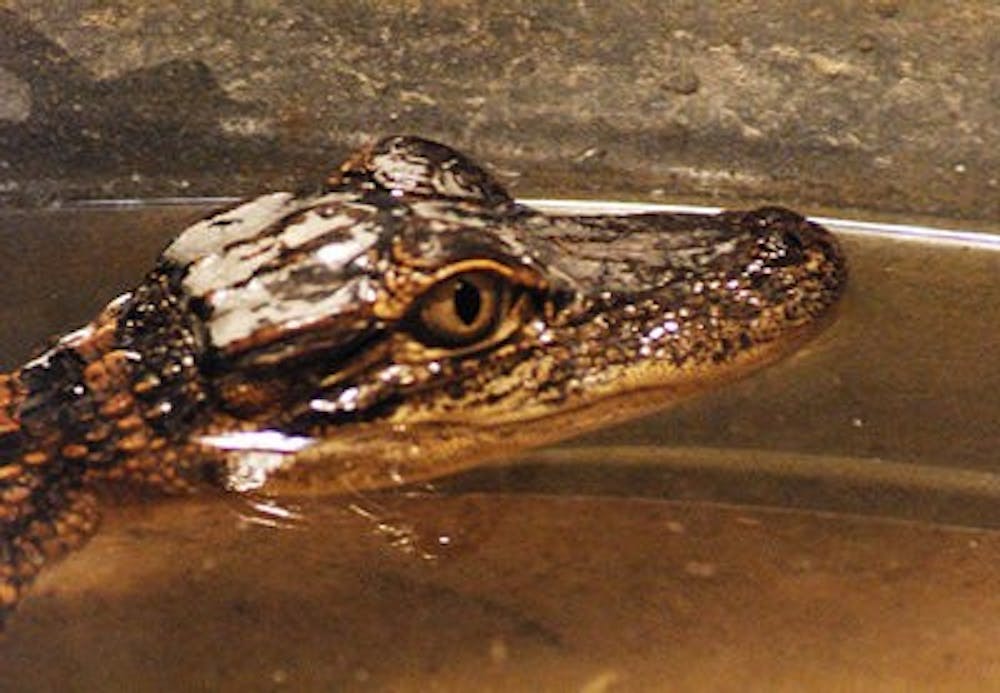Editor's Note: The pet owners' names and residence location have been withheld to protect their privacy and security.
A FedEx employee with a small brown box tucked under his arm knocked on the door of an apartment complex less than a mile from Auburn's campus. The residents woke up early, waiting for the box they had shipped to themselves overnight. One key piece of information separated the residents inside the door and the FedEx deliveryman outside; the box contained a live, baby American Alligator.
The cost of the one-foot alligator was split between three of the four residents for $94.99, plus $39.99 shipping. A small price to pay for an unusual college pet, according to the buyers.
The owners named their new pet Steve, in honor of the late crocodile hunter Steve Irwin.
Alligators are listed as threatened on the U.S. Endangered Species List. An adult male can grow as large as 14 feet and can be found in the wild from North Carolina to Texas. These reptiles are also illegal to have as pets.
A disclaimer on the alligator purchasing site said, "It is your responsibility to research any potential regulations governing the ownership of alligators in your area. We will not knowingly ship an alligator to a state that does not allow them."
Under the Alligator Protection Act, anyone possessing an alligator, alive or dead, can be charged with a felony or Class B misdemeanor. The lesser of the charges, which comes with a maximum fine of $2,000, is usually given, according to Capt. Chris Lewis, who works with the law enforcement division in District IV of the Alabama Wildlife and Freshwater Fisheries department.
Lewis said the majority of pet alligators confiscated are picked up along the Chattahoochee River, in the Mobile Delta or local ponds.
"I don't know if we would call them pets, per say," Lewis said. "But we have had people that possessed alligators. It's not very common, maybe once a year or every couple years."
Steve's owners said their neighbors don't know about the animal living next to them.
"We had our neighbor's dog run in one time," said one of Steve's owners. "We all yelled 'Don't let him eat the alligator,' but she thought we were joking."
The alligators are bred in captivity, according to the purchasing site.
"An alligator is a wild animal," said Richard Tharp, wildlife biologist with the Alabama Wildlife and Freshwater Fisheries department. "Wild animals do not make good domestic pets. People are probably not prepared to take care of an animal like this because they will not know their nutritional needs or the proper care."
In the wild, alligators eat whatever they can catch. They are cold-blooded and have times of the year when their diet slows down. Overfeeding a pet alligator is one of the many dangers of keeping them in captivity, according to Tharp.
Three months after arrival, Steve has grown. His black scales are interrupted by bright yellow stripes. What will one day be carnivorous teeth are only sand-sized nubs. His yellow-tinted olive eyes follow every movement.
Steve spat out a constant hiss in his four-and-a-half foot long metal trough. Hiding under his four-rock shelter in two inches of water and a thin layer of sand, he watched as people came and peered into his home. He also watched the gold-fish swimming on the other side of his tank, carefully avoiding his hungry jaws.
Peter caught a gold-fish with his bare hand, holding Steve in the other. Steve snapped it up, shook the fish and swallowed it whole.
Finally, the hissing stopped.
Do you like this story? The Plainsman doesn't accept money from tuition or student fees, and we don't charge a subscription fee. But you can donate to support The Plainsman.





